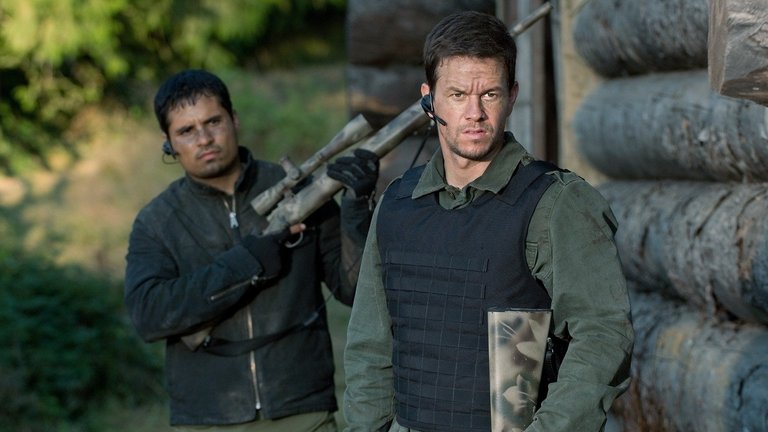
The career of director Antoine Fuqua offers an intriguing lens through which to examine the changing attitudes of Hollywood towards geopolitical subjects. In 2003, his film Tears of the Sun was released just before the US invasion of Iraq and was widely interpreted as a jingoistic celebration of American military power and its role in bringing democracy and preserving human rights around the world. Fast forward four years to Shooter, an action thriller that takes a diametrically opposed view, positing that US military adventures are part of the problem rather than the solution.
Based on Stephen Hunter's 1993 novel Point of Impact, the film tells the story of Gunnery Sergeant Bob Lee Swagger, played by Mark Wahlberg, an elite US Marine Corps sniper who takes part in a covert mission near the Ethiopian-Eritrean border. The operation goes awry, and Swagger loses his trusted spotter Donnie Fenn (played by Lane Garrison). Barely surviving the ordeal, he retreats to a quiet civilian life three years later but is soon approached by mysterious US government operatives led by Colonel Isaac Johnson (played by Danny Glover) who ask for his expert help in preventing an assassination attempt on the US President. Swagger deduces that the attempt will take place during a speech in Philadelphia and goes there to assist counter-sniper teams. However, it turns out that the real target is not the President but an Ethiopian archbishop, and Swagger has been set up as a convenient scapegoat. Wounded but resourceful, he escapes with the help of Fenn's widow Sarah (played by Kate Mara) and FBI agent Nick Memphis (played by Michael Peña), ultimately striving to prove his innocence and expose the conspiracy involving high-ranking US government officials.
Shooter is a film that is at once anachronistic and in tune with its time. Its anachronism stems from an old-school formula of 1980s action films, where a lone Ramboesque protagonist not only defies the odds against his survival but also easily dispatches small armies of enemies. Just like many action heroes from that era, Swagger quickly realizes that he won't defeat his enemies through conventional (i.e., legal) means and must resort to vigilantism in order to achieve any level of justice.
What makes the film modern is the script by Jonathan Lemkin, which wears its author's disgust with the policies of George W. Bush and the Iraq War on its sleeve. The dialogues explicitly mention abuses at Abu Ghraib, official lies about weapons of mass destruction or real motives for invasion. Furthermore, the plot even makes a connection to the JFK assassination, building on conspiracy theories about a cabal of US politicians, intelligence community, and military-industrial complex that would recently become known as the "Deep State." This phenomenon is represented by Senator Meachum, a despicably corrupt and evil figure played by Ned Beatty, who was obviously inspired by the dark figure of Dick Cheney. One can find present-day counterparts to this character in numerous influential bloodthirsty warmongering US senators.
Most of the target audience probably didn't think much of the film's politics and was more attracted to its old-school action. Fuqua, a director quite experienced in the genre, delivered with a series of exciting and well-choreographed scenes, including those that made viewers familiar with sniper tactics, portrayed in a very suspenseful way.
Shooter also benefited from good cinematography by Peter Menzies Jr., use of picturesque Canadian locations, as well as a serviceable music score by Mark Mancina. The cast is solid, with Mark Wahlberg delivering a stoic and resourceful performance that easily overshadows Michael Peña's portrayal of the protagonist's sidekick. Kate Mara is also good in her role, although it sometimes feels thankless, such as in the exploitative scene where she wears underwear while her character gets abducted by a psychopathic government operative played by unhinged Elias Koteas.
Critics, particularly those of a more "artsy" and snobbish persuasion, didn't like Shooter due to their bias against the action genre. This sentiment is evident even when films politically correspond with their own sentiments. On the other hand, the general audience was more open to Fuqua's work, making it into a solid commercial success.
In 2016, Hunter's novel received another adaptation in the form of Shooter, a TV series starring Ryan Phillippe in Swagger's role, which remained on air for three seasons.
At the end of the day, Shooter is a film that offers a compelling mix of action and politics, providing viewers with an entertaining and thought-provoking experience. While it may not be perfect, its strengths lie in its well-executed action sequences, solid performances, and timely political themes.
RATING: 6/10 (++)
Blog in Croatian https://draxblog.com
Blog in English https://draxreview.wordpress.com/
InLeo blog https://inleo.io/@drax.leo
Hiveonboard: https://hiveonboard.com?ref=drax
Rising Star game: https://www.risingstargame.com?referrer=drax
1Inch: https://1inch.exchange/#/r/0x83823d8CCB74F828148258BB4457642124b1328e
BTC donations: 1EWxiMiP6iiG9rger3NuUSd6HByaxQWafG
ETH donations: 0xB305F144323b99e6f8b1d66f5D7DE78B498C32A7
BCH donations: qpvxw0jax79lhmvlgcldkzpqanf03r9cjv8y6gtmk9
Posted Using InLeo Alpha